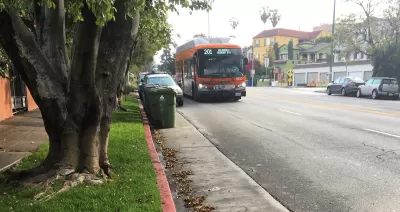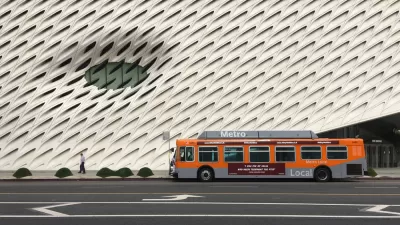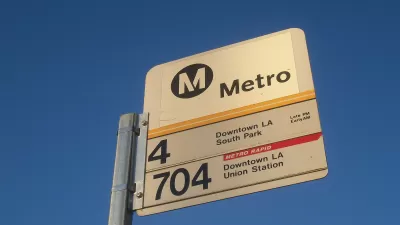Major changes are coming to the Metro bus system in the nation's second largest city. After three years of planning and public feedback, the Metro board has approved the NextGen bus plan.

The Los Angeles County Metropolitan Transportation Authority (Metro) Board of Directors recently approved the NextGen bus plan after three years of planning and a high profile outreach and public engagement campaign, according to an article by Steve Hymon for Metro's The Source.
Metro planning staff released a draft of the plan in January 2020, but the plan largely vanished from the public eye as the pandemic gutted transit ridership in the city. Now the plan for the nation's second busiest bus system will begin to implement service changes in December 2020, with a second and third round of changes coming in June 2021 and December 2021, respectively.
"Under the new plan — to be implemented in stages, beginning in December (more on this below) — buses will arrive every five to 10 minutes for 83 percent of current riders compared to around 48 percent today," according to Hymon.
One of the key changes of the NextGen plan will be to combine most rapid and local bus routes. "These new lines will stop fewer times than a local bus but a few more than a rapid. Transit signal priority that has been a key part of rapid service will also now work these new lines. The end result will be a faster door-to-door trip for all riders, whether they currently take Metro Local or Rapid routes," according to Hymon.
A significant obstacle standing in the way of full implementation of the NextGen plan includes ridership and fare revenues decimated by the pandemic. Metro staff are expected to deliver a plan for increasing service while dealing with declining system revenues later this year.
FULL STORY: NextGen Plan to improve Metro Bus system is approved by agency’s Board of Directors

Alabama: Trump Terminates Settlements for Black Communities Harmed By Raw Sewage
Trump deemed the landmark civil rights agreement “illegal DEI and environmental justice policy.”

Study: Maui’s Plan to Convert Vacation Rentals to Long-Term Housing Could Cause Nearly $1 Billion Economic Loss
The plan would reduce visitor accommodation by 25% resulting in 1,900 jobs lost.

Why Should We Subsidize Public Transportation?
Many public transit agencies face financial stress due to rising costs, declining fare revenue, and declining subsidies. Transit advocates must provide a strong business case for increasing public transit funding.

Paris Bike Boom Leads to Steep Drop in Air Pollution
The French city’s air quality has improved dramatically in the past 20 years, coinciding with a growth in cycling.

Why Housing Costs More to Build in California Than in Texas
Hard costs like labor and materials combined with ‘soft’ costs such as permitting make building in the San Francisco Bay Area almost three times as costly as in Texas cities.

San Diego County Sees a Rise in Urban Coyotes
San Diego County experiences a rise in urban coyotes, as sightings become prevalent throughout its urban neighbourhoods and surrounding areas.
Urban Design for Planners 1: Software Tools
This six-course series explores essential urban design concepts using open source software and equips planners with the tools they need to participate fully in the urban design process.
Planning for Universal Design
Learn the tools for implementing Universal Design in planning regulations.
Smith Gee Studio
Alamo Area Metropolitan Planning Organization
City of Santa Clarita
Institute for Housing and Urban Development Studies (IHS)
City of Grandview
Harvard GSD Executive Education
Toledo-Lucas County Plan Commissions
Salt Lake City
NYU Wagner Graduate School of Public Service





























